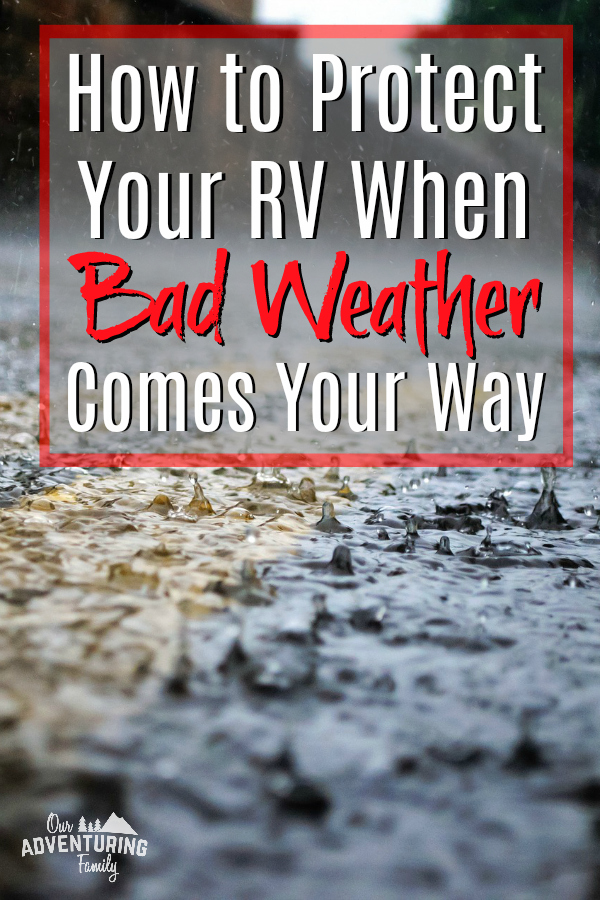This post may contain affiliate links. As an Amazon Associate I earn from qualifying purchases, but there is no additional cost for you. Please see my Disclosure page for more information.
So, you’ve waded through all the different makes and models of RVs and trailers and you finally have your RV or trailer. You’ve conquered your fears about driving a big RV or towing a trailer and you’ve gone camping a few times, maybe even gone on a road trip or two (perhaps a fall getaway for some leaf peeping?).
You’ve got all the neat gadgets that make RV life easier and more fun and you know you need to winterize before the first frost. You even took precautions to keep mice out of your RV.
But how do you protect your RV when bad weather hits?
Unfortunately, bad weather can cause damage any time of year. We’ve had tree branches fall on our trailer and our RV during wind and rain storms in the spring and summer. Hail can do a lot of damage, especially if you have an Airstream. Snow accumulation on the roof can do damage from above while flood waters can do damage from below.
Cosmetic damage from hail is one thing, but holes from falling branches are a whole different ball game. Those holes may start out small, but they allow water into the roof, walls, and even the floor, leading to significant damage. Damage that is invariably expensive to fix.
So how to protect your RV or trailer from all those hazards that might sneak up on you?
This will vary a bit, depending on if your RV is stored, or if you’re on the road. Whatever the case may be, have a plan in place and do what you can before the bad weather comes. Don’t be left scrambling for cover or safety while wind, rain, or flood waters swirl around you.
If you’re on the road:
Most campgrounds don’t have covered spots, though I’ve recently come across some Airstream-only campgrounds that do have covered campsites- so smart! If you’re not at one of those campgrounds and hail or windblown debris is coming your way, try to find shelter. A nearby barn, a self-serve carwash, etc.
If you can’t find shelter, you can sit out the storm and hope for the best, or you can try to get away from the bad weather. Use a weather radio to help you stay informed regarding which direction the storm is moving so you can avoid it. A tornado or flood will have no mercy on your rig, so it’s best not to play chicken with nature.
If your RV is stored:
Find a storage location that’s on high ground to avoid flooding issues. If you can, park at the top of a hill, rather than at the bottom of a hill or in a flood plain.
Have some sort of cover over your RV to protect from airborne debris. Garages, carports, RV covers, or tarps (don’t use a fabric cover or tarp on an Airstream though, as it will mar the finish) can help minimize the damage to your RV. A garage or carport will do a much better job than the much less expensive fabric cover or a tarp, but even the fabric cover or tarp can add a layer of protection.
A word of caution: If you live in a humid area, you may want to place Damp Rid packets or canisters in your RV while it’s stored. We’ve had a very wet summer and fall and have had one of the MaxxAir roof fans in our RV running, but the extension cord to the RV came unplugged. When we went out to the RV a few days later we found a layer of mildew growing on many of the surfaces. I was able to clean it up with minimal issues because I caught it so early, but excess humidity can definitely do damage to a closed up RV.
If your RV is parked under trees, clear any dead branches from the area, both in the overhead trees and the surrounding trees. Try to minimize the risk of damage from falling branches or other objects. Be aware that acorns falling from 100 foot oak trees can leave worse damage than a hail storm. Ask me how we know this 🙁
Try to anticipate what nature might throw at you, but be sure to inspect your rig frequently, especially after big storms. Insurance will cover initial damage (such as holes in the roof), but will rarely cover the water damage that occurs after that initial damage.
What have you done to protect your RV or trailer from bad weather?

